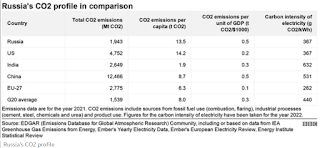Unraveling Russia's Shifting Climate Agenda Amidst Global Pressures
As the world scrutinizes climate action at the UN's COP28 summit in Dubai, Russia's stance on environmental commitments takes center stage. This article delves into the intricate changes in Russia's climate agenda, examining how geopolitical events, economic factors, and global pressures have molded the nation's approach to climate change.
- Russia, ahead of COP28, opposes the "phasing out" of fossil fuels, and its updated climate doctrine sidesteps the impact of fossil fuels on climate change.
- Despite commitments to carbon neutrality by 2060 and limiting greenhouse gas emissions, experts view Russia's targets as modest.
- The Climate Action Tracker rates Russia's climate targets as "highly insufficient" to meet the 1.5°C criteria of the Paris Agreement.
- Environmental initiatives in Russia have weakened amid the focus on the war in Ukraine and the need to replace Western goods domestically.
- Rising costs and dependence on imported technologies contribute to a rollback of environmental standards in Russia.
- The withdrawal of foreign companies, like Fortum, disrupts projects like wind farms, signaling challenges for Russia's climate initiatives.
Amidst the global spotlight on climate action during the COP28 summit, Russia's climate agenda undergoes a complex transformation. This article navigates the nuanced shifts in Russia's approach to climate change, shaped by geopolitical dynamics, economic considerations, and international pressures.
Russia's Ambiguous Climate Stand: As the world grapples with climate imperatives at COP28, Russia's stance emerges as a focal point of discussion. Expressing resistance to the "phasing out" of fossil fuels and a climate doctrine devoid of fossil fuel considerations, Russia navigates a delicate balance between global expectations and its economic priorities.
Modest Targets and Global Critique: Despite pledging carbon neutrality by 2060 and limiting greenhouse gas emissions, Russia's commitments fall under scrutiny. Climate experts deem these targets as modest, with the Climate Action Tracker rating them as "highly insufficient" to align with the stringent criteria of the Paris Agreement.
War's Impact on Environmental Initiatives: The ongoing conflict in Ukraine has diverted Russia's attention, resulting in a dilution of environmental initiatives. The urgent need to replace Western goods domestically has led to compromises in Russia's commitment to stringent environmental standards.
Rollback of Environmental Standards: In a significant setback, Russia rolls back environmental standards, permitting the production of vehicles with lower environmental standards. Alexander Shokhin, a prominent business lobbyist, advocates for further downgrading climate commitments amid Western sanctions, citing rising costs.
Foreign Withdrawals and Project Disruptions: The departure of foreign entities, exemplified by Fortum's exit disrupting wind farm plans, underscores the challenges faced by Russia's climate initiatives. Collaborations essential for environmental projects face uncertainties in the aftermath of geopolitical tensions.
Global Pressure and Economic Realities: Global pressure, particularly from the European Union's carbon border tax initiative, compels Russia to address climate change seriously. The initiative, slated for 2026, targets Russian industries like iron, steel, aluminum, and fertilizers, emphasizing the need for decarbonization.
Positive Inertia Amidst Declining Ambitions: Despite a decline in climate ambitions, Russia maintains positive inertia in some sectors. Private firms, driven by managerial enthusiasm and available resources, actively pursue decarbonization, contributing to the nation's climate agenda.
Unplanned Factors: Economic Slowdown: An unexpected factor influencing Russia's carbon emissions trajectory is an economic slowdown. As economic dynamics shift, Alexander Shirov from the Russian Academy of Sciences emphasizes the continued viability of Russia's goal for carbon neutrality by 2060.
Conclusion: Navigating a complex landscape of global expectations, economic considerations, and geopolitical realities, Russia's climate agenda undergoes a nuanced evolution. While challenges persist, positive inertia and unplanned factors may play pivotal roles in shaping Russia's future trajectory toward environmental sustainability. As the world observes COP28, Russia's position adds a layer of complexity to the global discourse on climate action.
Frequently Asked Questions (FAQs):
- How does Russia's climate doctrine differ from global expectations?
- What factors contribute to the criticism of Russia's climate targets by experts?
- How has the conflict in Ukraine impacted Russia's environmental initiatives?
- What led to the rollback of environmental standards in Russia, particularly in the automotive sector?
- How are global pressures, including the EU's carbon border tax, influencing Russia's approach to climate change?
Explore the intricate shifts in Russia's climate agenda amid global scrutiny at COP28. Uncover the complexities shaping Russia's stance on climate change, from economic considerations to geopolitical pressures.
#RussiaClimateAgenda, #COP28Insights, #GlobalClimatePolicy, #GeopoliticsAndClimate, #EnvironmentalShifts

